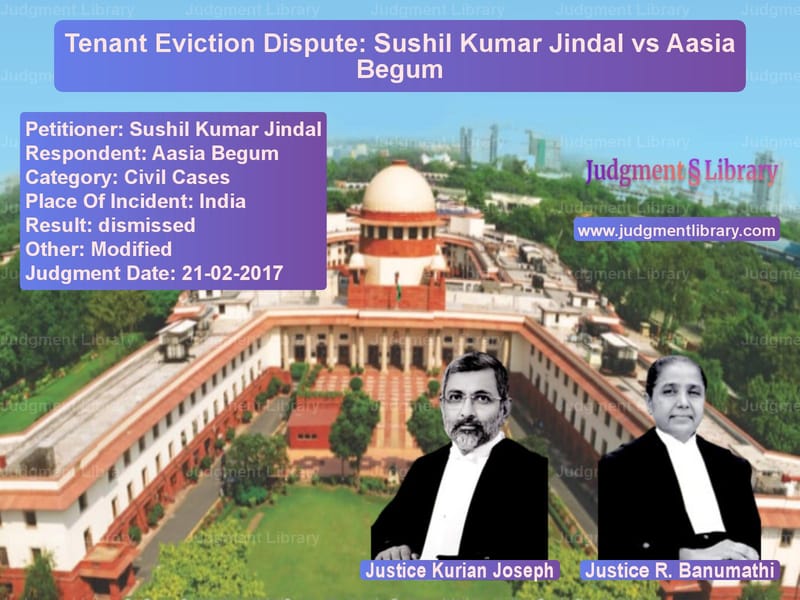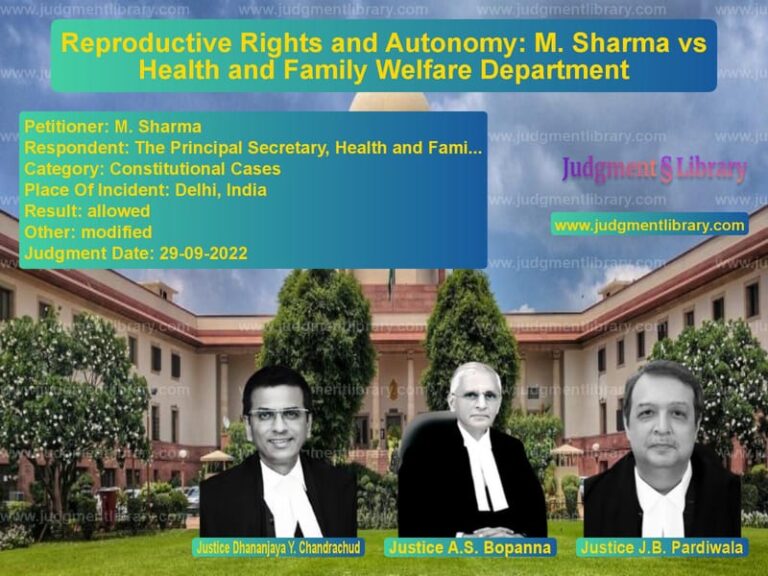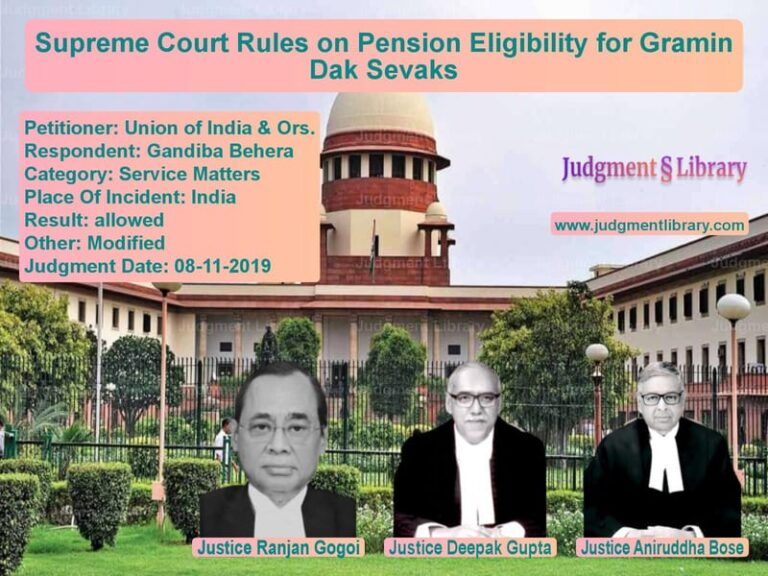Tenant Eviction Dispute: Sushil Kumar Jindal vs Aasia Begum
The case of Sushil Kumar Jindal vs Aasia Begum revolves around a landlord-tenant dispute concerning eviction based on bona fide requirement. The main question before the Supreme Court was whether the eviction order upheld by the High Court was justified and whether the tenant should be granted additional time to vacate the premises.
Background of the Case
The appellant, Sushil Kumar Jindal, was a tenant occupying a property owned by the respondent, Aasia Begum. The respondent sought eviction of the appellant on the grounds of bona fide requirement, which was accepted by the Rent Controller and later upheld by the High Court. The appellant, dissatisfied with the ruling, appealed to the Supreme Court challenging the eviction order.
The appellant argued that the findings of the lower courts were incorrect and that the eviction was unjustified. However, the Supreme Court needed to determine whether there was any legal reason to overturn the eviction order.
Key Legal Issues
- Whether the High Court correctly upheld the eviction order based on bona fide requirement.
- Whether the tenant should be granted additional time to vacate the premises.
- Whether the tenant was required to continue paying rent until eviction.
Arguments by the Petitioner (Sushil Kumar Jindal – Tenant)
- The appellant argued that the eviction order was unjustified and that the High Court had erred in upholding the decision of the Rent Controller.
- He contended that the eviction was not based on genuine bona fide requirement.
- The appellant requested that the Supreme Court reconsider the findings of the lower courts and allow him to retain possession of the property.
Arguments by the Respondent (Aasia Begum – Landlord)
- The respondent asserted that she had established a bona fide requirement for the property.
- She emphasized that both the Rent Controller and the High Court had ruled in her favor, confirming that the eviction was justified.
- The respondent requested that the Supreme Court uphold the eviction order and direct the appellant to vacate the premises.
Supreme Court’s Observations
The Supreme Court reviewed the case and found no grounds to interfere with the eviction order. The Court stated:
“We do not find any reason to interfere with the impugned order passed by the High Court, by which the High Court has upheld the views taken by the Rent Controller on the bonafide requirement.”
However, considering the facts of the case, the Court granted the appellant time until December 31, 2017 to surrender vacant and peaceful possession of the premises.
Final Judgment by the Supreme Court
The Supreme Court ruled:
- The appeal was dismissed.
- The appellant was given time until December 31, 2017, to vacate the premises.
- The appellant was required to file an undertaking in the Court within four weeks confirming compliance with the eviction order.
- The appellant was directed to pay rent at a rate of Rs. 2,450 per month to the respondent until the eviction date.
- Pending interlocutory applications, if any, were disposed of.
The Supreme Court concluded:
“The appeal is, accordingly, dismissed.”
Analysis of the Judgment
The ruling highlights key legal principles related to landlord-tenant disputes:
- Finality of Concurrent Findings: The Supreme Court reaffirmed that when multiple courts have ruled on a case, there must be compelling reasons to overturn their decision.
- Bona Fide Requirement: The judgment reinforces the principle that landlords have the right to reclaim their property if they establish a genuine need.
- Time for Compliance: The Court demonstrated judicial balance by allowing the tenant additional time to vacate.
Conclusion
The ruling in Sushil Kumar Jindal vs Aasia Begum sets a precedent for eviction cases based on bona fide requirement. The Supreme Court upheld the principle that landlords have a right to reclaim their property when their need is justified and legally established.
At the same time, the Court ensured fairness by allowing the tenant time to vacate the premises while requiring continued rent payment. This decision strengthens property rights and underscores the importance of respecting legal eviction processes.
Don’t miss out on the full details! Download the complete judgment in PDF format below and gain valuable insights instantly!
Download Judgment: Sushil Kumar Jindal vs Aasia Begum Supreme Court of India Judgment Dated 21-02-2017.pdf
Direct Downlaod Judgment: Direct downlaod this Judgment
See all petitions in Property Disputes
See all petitions in Landlord-Tenant Disputes
See all petitions in Specific Performance
See all petitions in Judgment by Kurian Joseph
See all petitions in Judgment by R. Banumathi
See all petitions in dismissed
See all petitions in Modified
See all petitions in supreme court of India judgments February 2017
See all petitions in 2017 judgments
See all posts in Civil Cases Category
See all allowed petitions in Civil Cases Category
See all Dismissed petitions in Civil Cases Category
See all partially allowed petitions in Civil Cases Category







